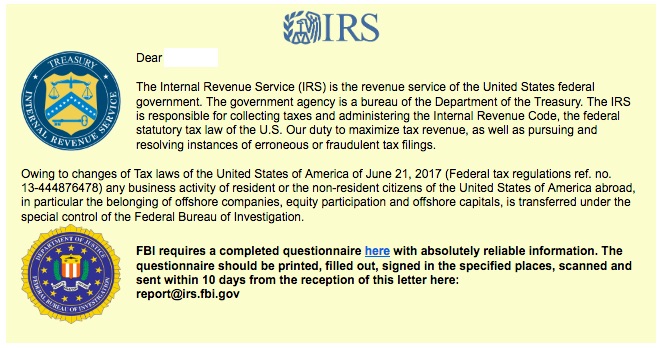Equifax, one of the leading consumer credit reporting companies, recently revealed that it fell victim to a cyber attack earlier in the year. Early reports indicate the data breach compromised over 140 million individuals’ confidential information.
This was a big one.
Stealing confidential information is a big business, and the bad guys are consistently improving their methods to accomplish this end. One example of a creative attack vector currently making the rounds targets U.S. taxpayers by leveraging the Internal Revenue Service (IRS) and Federal Bureau of Investigation (FBI) brands.
If you receive an email purporting to be from the IRS or FBI, do not click on any links or attachments! Here is a more detailed description of the scam:
“The scam email uses the emblems of both the IRS and the Federal Bureau of Investigation. It tries to entice users to select a “here” link to download a fake FBI questionnaire. Instead, the link downloads a certain type of malware called ransomware that prevents users from accessing data stored on their device unless they pay money to the scammers.

The IRS does not use email, text messages or social media to discuss personal tax issues, such as those involving bills or refunds. For more information, visit the “Tax Scams and Consumer Alerts” page on IRS.gov. Additional information about tax scams is available on IRS social media sites, including YouTube videos.”
Please be aware of this and other “phishing” schemes in general. Do not click on links or open attachments from people you do not know. Even if an email comes from a known contact, only open a link or attachment if it is something you are specifically expecting from that contact. Otherwise, the data on your computer could be held hostage for a hefty ransom!


